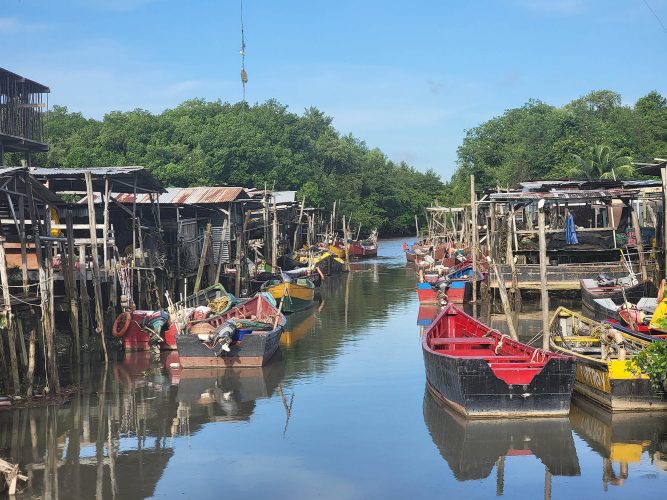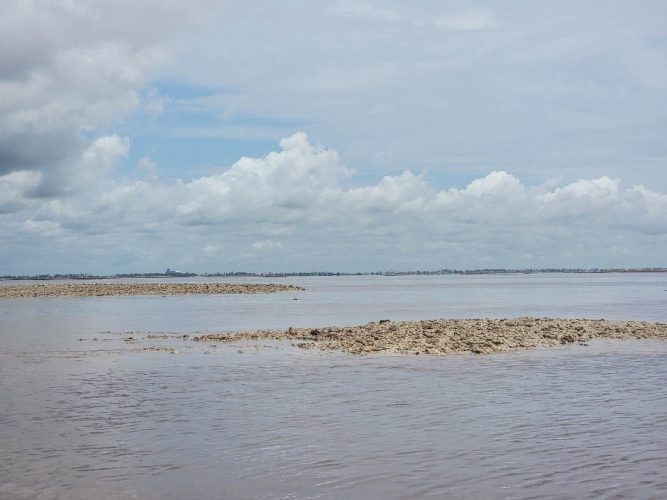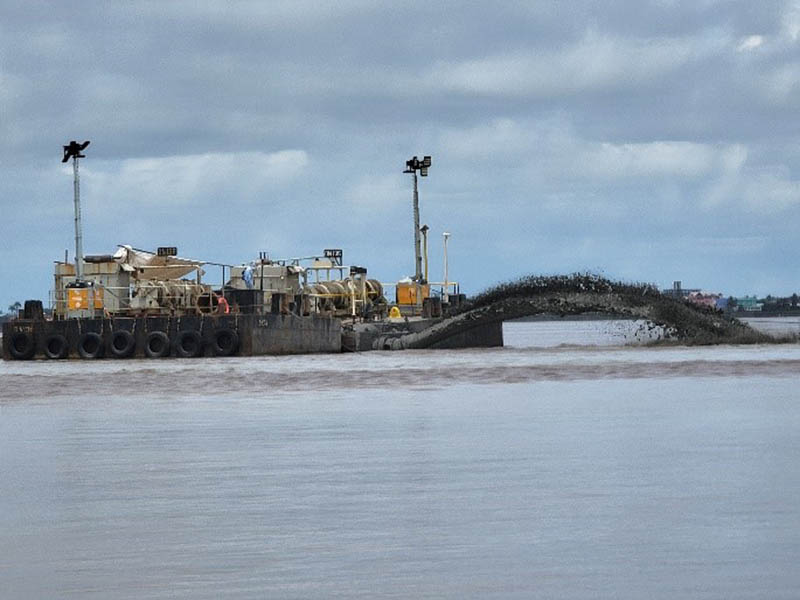Contrary to what the developers of the Vreed-en-Hoop shore base have asserted, fishermen on Tuesday and Wednesday told Stabroek News that their fish pens have been fouled by mud and refuse thrown up by dredging off the Demerara River mouth.
Dozens of fishermen are said to have been affected and some have reported that the Fisheries Department of the Ministry of Agriculture has been engaged in negotiating compensation for some persons.

Stabroek News was taken on Tuesday morning to the area by one of the affected fishermen. The area is approximately one and a half miles north east, following the Demerara main ship channel.
‘Fishermen lives don’t matter!’ was the refrain of the fishers who are being impacted by the dredging activities in preparation for the construction of the Vreed-en-Hoop Shore Base Project.
The artisanal fishermen from the East and West Bank Demerara believe they are too uneducated to have a voice.
“The dredging raising up all these things (trash and seaweed) on the ocean floor and that’s what we finding in our fish pens and just little bit of fish,” said a fisherman from Diamond, who wished to remain anonymous.
For the East Bank fishermen, the majority of their catch is now trash, leaves and weeds and a few fish to distribute among four fishermen.
It has been just over a month since the sod was turned to officially commence the construction of the Port of Vreed-en-Hoop, but phase one of the project – the deepening, widening, and dredging of a 100 to 125 metres wide and 7 to 10 metres deep access channel in the Atlantic Ocean – is already having significant impact on the lives of artisanal fishermen on the East and West Bank of Demerara.
The project was described by Minister of Natural Resources, Vickram Bharrat as one that will see immense benefits coming into Region Three, including employment and income-generating opportunities that will play a transformative role in developing the lives of residents.
However, for the artisanal fishermen it seems as though the development in question will come at their expense now that they are losing their main source of income because of the ongoing dredging.
According to a fisherman, in one instance, one of the seines that forms the fish pen caught a type of seaweed which resulted in them having to destroy the seine to remove it.
On the West Bank, it’s a similar situation but instead of ocean trash in their fish pens, it’s mud galore.
“We going out to our fish pens and only finding slushes and slushes of mud. Barely any fish,” said a fisherman named Ramesh.
The build-up of mud left behind by the dredging activity now creates a stretch of barren expanse in the Atlantic, which fishermen are blaming for the decline in their fish catch.
“That is what is making the fishes less. Nothing is the same. To get fish, we have to travel past the area where they are dredging because the mud that build up is like a really long wall. Our boats can’t cross that. We have to go around it and around the dredges,” a fisherman from the West Bank said.
Not only is the “mud wall” preventing fish from getting past it or fishermen from travelling their normal route, it is also trapping boats. Unsure of the height of the mud which extends and rises daily, fishermen would unknowingly steer their boats into it as it isn’t yet above the water and get stuck for hours.
Around the mud
“If we want to eat, we have to travel around the mud and it’s not like we can fish anywhere we want. We have licences for some area and we now have to deal with getting stuck,” the fisherman added.
At every spring tide, fishermen from communities like Grove, Diamond and Soesdyke among several others on the East Bank and Goed Fortuin on the West Bank would travel to their fish pens in the Demerara River or miles into the Atlantic Ocean to patiently wait for tide levels to drop so they can remove captured fish in the pens. Their catch, although having declined in the last few years, is usually satisfactory.
“Enough to sustain us,” a fisherman, who asked not to be named, pointed out while speaking with this newspaper. The dredging of the access channel changed all of this.
The fishermen are now wondering how they will be able to sustain their families in the future.
“Since we barely catching fish and it is expensive to go out, all we eating now is egg and rice,” said one fisherman who wanted to explain how dire the situation is for his family.
The shore base, which is being undertaken by Vreed-en-Hoop Shorebase Incorporated (VEHSI), is a component of the Port of Vreed-en-Hoop project. VEHSI is a joint venture between NRG Holdings Incorporated—a Guyanese-owned consortium comprising Hadi’s World Incorporated, National Hardware Limited and ZRN Investments Incorporated—and Jan De Nul, a Luxembourg-based engineering and construction firm that specialises in marine services, offshore services, civil engineering, environmental management activities and project development.
According to a fisherman from Grove, no consultation was done before the dredging began and they weren’t even officially informed. Fish pens that were in the area where the channel is being dredged were marked by the Department of Fisheries of the Ministry of Agriculture indicating to owners that they would have to be removed. They were also told that they would be compensated for their pens but to date some are yet to receive their compensation package.
Similarly, on the West Bank, fishermen say that they were not consulted before the project started. One fish pen was discovered to have belonged to a man from Goed Fortuin and he was told that he would be compensated but this promise has not been kept.

Lone
Today, a lone fisherman from the West Bank village is expected to meet with NRG. According to fishermen in Goed Fortuin, no other fisherman was summoned but because they are being impacted by the dredging, they plan to have their concerns raised through the fisherman who will be meeting with the consortium.
“We are uneducated, so we stay silent but because it is affecting us badly, we have to say something,” one fisherman interjected, to which others present, agreed.
“Right now, we supposed to be out in the sea but because it is expensive to go out we are here. All the boats are moored,” added Ramesh.
Stabroek News was able to confirm that at least 80 artisanal fishermen are currently being affected by the dredging on both sides of the Demerara River.
NRG had previously stated that it had undertaken extensive consultation with fisherfolk in the area. “The impact of the project on the fisherfolk and their livelihood was a focus of the Environmental Social Management Plan. The plan has accessed the available fisheries data for the area from the Department of Fisheries. This was supplemented by collecting landing site data to understand fish stocks and the landings in the area,” NRG said in its statement.
The Environmental Protection Agency granted NRG Holdings an environmental authorization for the project last September. In a notice, the EPA stated that the shore base would not require an Environmental Impact Assessment, noting that the project was screened and categorised as having no significant impacts. And while the EPA did not state that the proposed facility would be in an area with mangroves, it noted that “detailed specific mitigation measures” should be explained.
The EPA’s decision to not require EIAs for large oil and gas projects has raised concerns. Although included in the project summary, limited information on the dredging of the access channel is included, and no environmental or social impacts were recorded.
NRG has promised to deliver a completed facility to Exxon by the fourth quarter of 2023. The facility will be heavily focused on aiding Exxon’s construction and fabrication efforts.
The facility is expected to generate at least 300 jobs during the construction phase while the jobs generated during the operation phase will depend solely on the needs of Exxon.
In a letter to Stabroek News, environmentalist Janette Bulkan raised concerns about the dredging activities. “The area defined for dredging crosses traditional fishing grounds of the artisanal fishermen. Few fishermen read the newspapers and I am not aware of any other attempt to inform them of the disruption to their business.”










